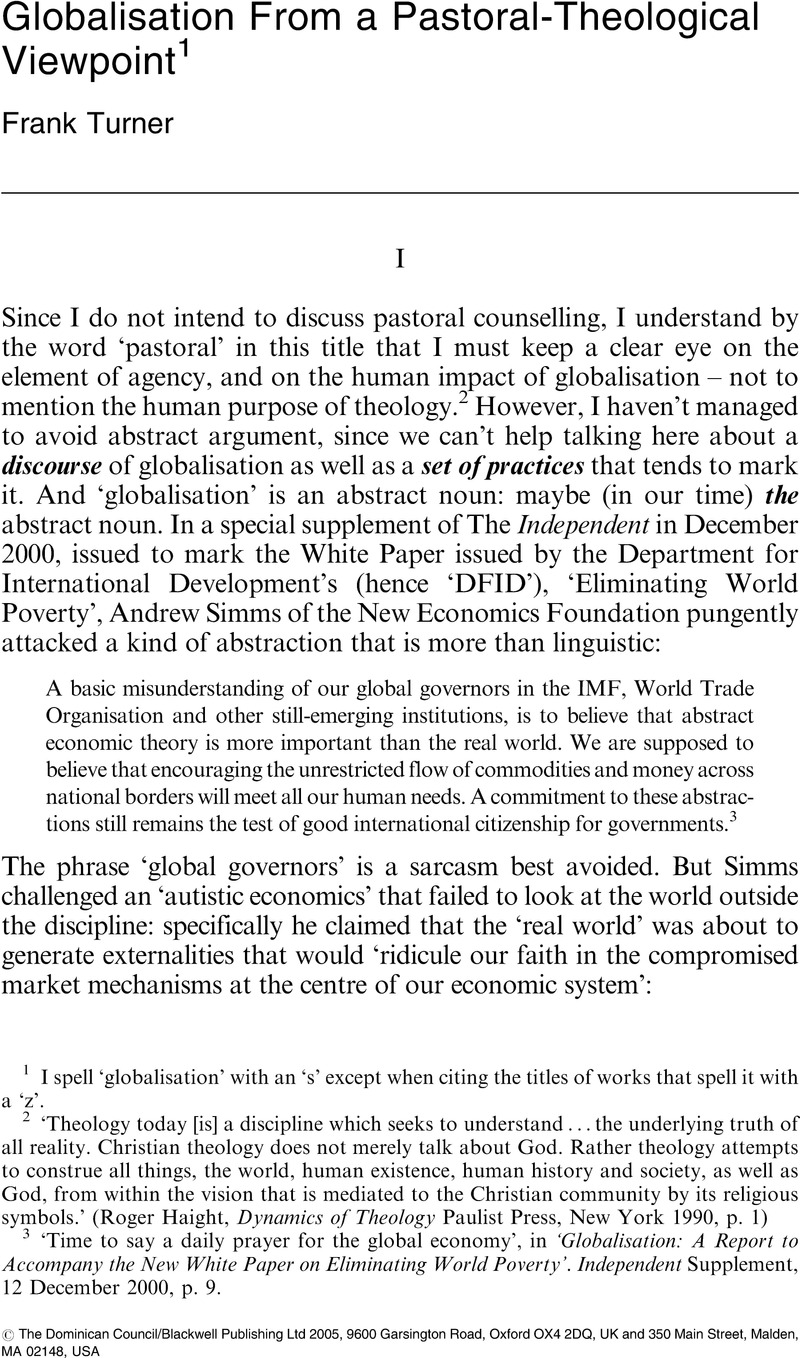No CrossRef data available.
Published online by Cambridge University Press: 01 January 2024

I spell ‘globalisation’ with an ‘s’ except when citing the titles of works that spell it with a ‘z’.
2 ‘Theology today [is] a discipline which seeks to understand…the underlying truth of all reality. Christian theology does not merely talk about God. Rather theology attempts to construe all things, the world, human existence, human history and society, as well as God, from within the vision that is mediated to the Christian community by its religious symbols.’(Haight, Roger, Dynamics of Theology Paulist Press, New York 1990, p. 1Google Scholar)
3 ‘Time to say a daily prayer for the global economy’, in ‘Globalisation: A Report to Accompany the New White Paper on Eliminating World Poverty’. Independent Supplement, 12 December 2000, p. 9.
4 It is the new ‘hidden hand’: what Adam Smith posited of the market is now posited of globalisation, and this also suggests a latent affinity between globalisation and market capitalism.
5 Commercially sensitive information, for instance, is what the economist Fred Hirsch called a ‘positional good’ like a quiet country cottage – which is only useful to you if not many other people have one too.
6 Hazel Henderson, Beyond Globalization, for the New Economics Foundation, Kumarian Press, West Hartford Conn, 1999, p. 1. I rely quite heavily on this brief and excellent book.
7 Linden, Ian, A New Map of the World, Darton, Longman & Todd, London 2003, p. 10Google Scholar. One of my difficulties in writing this paper is that it's written in the shadow of a book that has said much of what I would like to have said had I been capable of doing so.
8 Almost immediately, in 1991, Centesimus Annus countered this facile claim by pointing to the ethical defects of the modes of global capitalism, that permitted or encouraged ‘situations in which the rules of the earliest period of capitalism still flourish in conditions of ruthlessness in no way inferior ro the darkest moments of the first phase of industrialisation. John Paul II, Centesimus Annus, 1991, § 33. The argument continues as far as the descriptions of acceptable and unacceptable capitalism in § 42.
9 ‘Globalisation and Faith‐Justice’ a Debate: Promotio Iustitiae 2003/5(81), p. 28Google Scholar.
10 Shiva, Vandana, Lecture, Reith, reprinted as “Globalization and Poverty,”Resurgence No 202, Sept‐Oct 2000, pp. 15Google Scholar.
11 Address of Pope John Paul II to participants of the plenary assembly of the Pontifical Academy of Sciences, 2 May 2003.
12 Calvocoressi, Peter, The British Experience 1945–75, Penguin, Harmondsworth 1978, p. 169Google Scholar.
13 COMECE Ad‐Hoc Group on Global Governance, Global Governance: Our responsibility to make globalisation an opportunity for all, Brussels 2001. The Group was chaired by Michel Camdessus, formerly Managing Director of the IMF.
14 Take the case of a Philippina nanny in London earning £200 per week caring lovingly for other people's children. She may pay $40 per week to a local nanny looking after her own children in Manila: that woman's children in turn are looked after for nothing in the village. Love can be an export like any other, but at great human cost. As was pointed out in discussion, these transactions, commercialising love would show up in two countries’ Gross National Products, making them ‘richer’.
15 Rowan Williams, Archbishop of Wales, ‘Address to the Christian Association of Business Executives’, November 2001.
16 Tony Blair, ‘The Doctrine of the International Community’, Chicago Economics Club, 22 April, 1999.
17 Korten, David C, When Corporations Rule the World, Kumarian Press, West Hartford, Connecticut, 1995, p. 319Google Scholar.
18 An attempt to calculate the overall sum of money spent on bribes worldwide was made by the World Bank Institute. According to an April 8 press release, the amount was put at more than $1 trillion a year. Daniel Kaufmann, the institute's director for Governance, says this figure is an estimate of actual bribes paid in rich and developing countries alike. (Report in ‘Zenit’ newlsletter, July 31st 2004)
19 Association of Episcopal Conferences of the Central African Region (ACERAC), The Church and Poverty in Central Africa: the Case of Oil, Malabo, Equatorial Guinea, July 2002.
20 Pax Christi International CIDSE, Caritas Europa, ‘Transparency: A Christian Concern,’Briefing Vol 34, Issue 1 (January 2004), pp. 44–50Google Scholar; Catholic Relief Services, Bottom of the Barrel: Africa's Oil Boom and the Poor, Baltimore, Maryland, 2003Google Scholar.
21 Jonathan Raban, “The Greatest Gulf”, Guardian Weekend, 19 April 2003, pp. 4–6.
22 ‘In the deepest sense, a call for the globalisation of solidarity also involves the urgent question of the protection of the environment and the earth's resources. The “crying out of all creation”(Romans 8:22) is no longer a matter of eschatological tensions but a paroxysm of death which strives to grip humanity itself in order to destroy it.’, in Post‐Synodal Apostolic Exhortation: Pastores Gregis, 16 October 2003.
23 In discussion it was suggested that ummah need not necessarily be regarded as a primordial element of Islam, since is has been reinforced by Muslim communities’ sense that they live under severe pressure from hostile forces and world‐views.
24 This phenomenon is not unique to Islam. I am told that in the one year since the war in Iraq ‘ended’, fifteen evangelical Protestant churches, each well‐endowed, have sprung up in Baghdad alone.
25 Cormac Murphy‐O’Connor, ‘The Standards by Which War with Iraq Must Be Judged’, The Times, 5 September 2002. In contrast, DFID is currently responding to the need to fund the rehabilitation of Iraq (and, to be fair, to avoid abandoning the Millennium Development Goals) by way of a restructuring programme that involves a steep reduction in the funding of projects of ‘Middle Income Countries’– a list currently including almost all of Latin America including Argentina, where an estimated 55% of the population are in poverty.
26 The term ‘socio‐economic’, for instance, risks blurring all kinds of latent conflicts between economic and broader social objectives (‘efficiency’ vs. ‘full employment’, etc.)